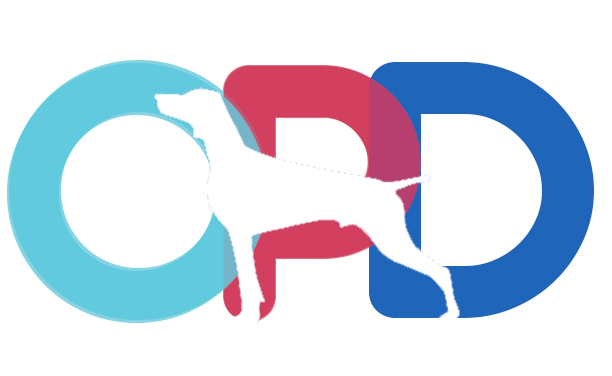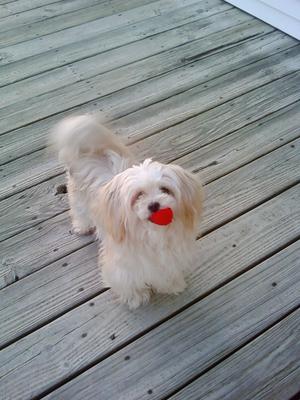by Karen
(Moberly, MO USA)
We took Minnie (one of the maltese) to our vet about a month ago after noticing her sister (Millie) was constantly licking her face, and noticed that above and below Minnie’s eyes, she was losing hair and becoming open wounds. Also found a hot spot on outside of ear (which was hidden under her hair), and found large scab-like mass on her lower lip (½ on inside, ½ outside), also hidden by hair.
Our vet diagnosed Minnie with yeast infection and prescribed Tresaderm 1x daily x10 days, but we did not want to continue with antibiotics, so did 4 days and tried some other remedies, such as apple cider vinegar/water solution, and frankincense/lavender/ distilled water mist on the affected areas (with exception of eyes)and other topical treatments .
We also used Colloidal Silver gel on affected areas to help with itching and encourage healing – still not completely gone, but much better…. She still licks her front legs as if the yeast is still so we are now applying frankincense/lavender/ distilled water solution with cotton ball topically every evening.
After doing research on yeast infection, I realize all of the dogs have overgrowth of yeast on various levels. Their current diet consists of Taste of the Wild (grain-free) dry dogfood and Alpo canned “filet mignon” dogfood (which we are trying to get away from. I have made a “gravy” to put on their dry food to try and replace canned dogfood – and have used for last 6 months, but stopped when Minnie was diagnosed with yeast infection. I was afraid the carb content of the sweet potatoes would increase yeast production. The gravy consisted of ground turkey, sweet potatoes, oatmeal (ground into powder, low sodium chicken and 4-6 cups of water. We now use gravy with ground turkey, broth, water, and powdered oatmeal.
CURRENT PROBLEM:
Millie is our long-haired maltese with only one eye (defective eye appears to be congenital deformity – has had no problems other than total blindness in that eye). She is a very loving and playful dog, and loves to be held or lay on your lap. On the other hand, she is very protective of her home and barks at everything. She does not like visitors and will viciously (lol) bark, but if approached, she will run and hide under the chair.
Now, for the past 3 days, Millie has a horrible cough that sounds similar to how kennel cough is described in the literature – but I don’t think that is what she has….. It’s a dry, non-productive cough. I’m really concerned that it may be a fungal infection that she contracted from licking Minnie’s wounds in trying to take care of her. My biggest fear is that this will work it’s way into pneumonia…
She has not been anywhere except vet to getrabies/distemper vaccine (which left her lethargic and nearly unable to walk for a few days….never again…!!!) She only goes outside to go to the bathroom. She continues to be active and playful with no problems eating or drinking. The coughing lasts 5-10 seconds and occurs when she gets excited, It is very loud – and almost sounds like she’s “barking” (6-8 coughs) – then a gag that sounds like she’s trying to cough a hairball.
She may have up to 4-5 spells within 30 minutes; then may be several hours before next spell. All 3 maltese are confined to large family room with tile flooring due to “accidental pottying” – other animals allowed to roam
We have been using Pet Armour monthly flea treatment over summer; last tx was August 20. We just groomed over the weekend – no fleas, but they continue to itch.
I believe that Minnie and Millie have, from what I have read from researching, a collapsed trachea – but this cough does not sound like the other occasional cough. Millie’s cough now, is much louder and more distinct; sounds more like a bark.
QUESTION:
Since I don’t have time to continue researching and trying new things out of fear of her getting worse, I am asking for the best option to rid her of this cough.
I believe this may be yeast-related, but having never experienced this before, I am not totally sure. Please help me….I don’t have any biological children of my own, so these are my “kids“…
BACKGROUND INFO:
We have the following rescue pets in our home.
3 maltese – Minnie & Millie are approximately 7-8 years old; Maggie is about 10?
1 black lab mix (Mackenzie)- 13 years old
2 cats – yellow tabby (Harley)& black short hair (Oreo)- (strictly indoor cats….)
Really appreciate your help and your service…..we don’t have access to holistic vet care in central Missouri.
God bless you…..
Comments for Could Dog Cough Be Related to Yeast Infection? | ||
| ||
| ||
| ||
Do you believe in holistic pet care? If so, please tell your friends about us. Thank you for supporting our efforts!
Also see…
- Back to Dog Health Problems Symptoms / Dog Illness Signs Symptoms / Natural Dog Remedies
- Back to 10 Best Dog Food Options / Dog Food Ratings / Buy Dog Food Online
- Back to Conventional vs. Holistic Veterinarians
- Back to Organic Dog Supplies Online
- Back to Pet Friendly Airlines / Pet Friendly Travel
- Back to Organic Pet Digest Natural Dog Care Home Page



